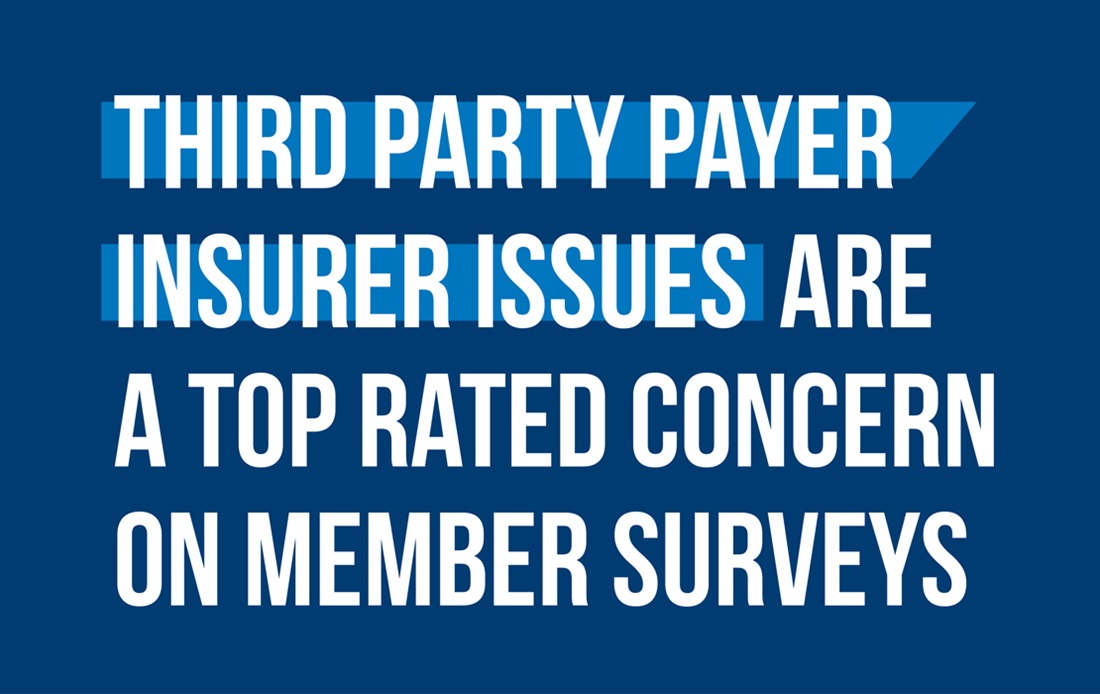Understanding Dental Insurance Issues
Dental insurance issues are among dentists’ top concerns. However, federal antitrust laws limit the ADA’s ability to influence insurance reimbursements and related benefit policies.
Medicare Advantage (Part C) Plans
Learn how Medicare Advantage (Part C) Plans work with dental coverage.
New to dental insurance?
Dental Insurance 101: Understanding PPO Plans - Understanding the basics for the front office staff.
Trends in the Dental Insurance Industry
Learn about major trends in the national dental benefits marketplace.
Self-funded Dental Plans
What you need to know about federally governed self-funded ERISA dental plans.
Top 5 Questions on Dental Benefit Issues
Dental benefit issues such as delayed or denied payments and contractual clauses can affect revenue for a dental office.
Top claim submission and processing concerns
According to the Code on Dental Procedures and Nomenclature, this procedure is performed following periodontal therapy and continues for the life of the dentition. Periodontal maintenance is often denied, however, because many carriers have limited benefits for this procedure. Reports received from our member dentists indicate that some payers have limited this procedure to being paid as a benefit only within 2 to 12 months of SRP.
Many dentists don't understand why claims for SRP are denied when the patient has abnormal pocket depths. A claim may be paid on a patient with 4mm pockets while at other times the same payer may deny the same procedure for another patient who had the same or similar clinical presentation.
D4341, D4342 Coding for Periodontal Scaling and Root Planing
Many complaints concerning the denial of core buildups were brought to the attention of the ADA Council on Dental Benefit Programs. Dentists perform this procedure when it is necessary prior to restoring a tooth with a crown. Complaints centered on the lack of a benefit for this procedure.
Although it is incumbent upon patients to understand their coverage, many times the policies are not easily understood by lay people. It can be time consuming for the dental office to first learn about and then explain the terms of any particular policy to a patient. Also, since policies can change at the beginning of a plan year, this can make it very difficult for any dentist to understand how they will be paid for any procedure. Dentists use the pre-authorization process to determine a patient's coverage.
One of the biggest complaints concerning third-party claim payment is lost claims and lost X-rays. Many dentists report sending in claims or X-rays several times before the insurance company will acknowledge receipt. Often X-rays are submitted with the claim, but the dentist will receive an explanation of benefits requesting the X-rays.
Bundling is defined by the ADA as "The systematic combining of distinct dental procedures by third-party payers that results in a reduced benefit for the patient/beneficiary." Many dentists want to know what the purpose of developing a procedure coding system with separate codes for distinct dental procedures is when third-party payers simply ignore it. Although there are some instances of bundling due to improper filing of the claim, the instances of concern to dentists are when procedures which are legitimately separate are bundled either inappropriately, or due to contract provisions without explanation.
A type of cost containment measure used by many third-party payers is the least expensive alternative treatment, also known as the least expensive professionally acceptable treatment clause. Under a LEAT clause, when there are multiple viable options of treatment available for a specific condition, the plan will only pay for the least expensive treatment alternative.
Many times when a third-party payer mistakenly pays a dental provider, the payer will request a refund of the overpaid amount. In some cases, refund requests have been sent to dentists more than two years after the payment was made. The patient may no longer be a patient of record with that dentist.
The ADA policy is based on a simple premise, the patient should get the maximum allowable benefit from each plan. In total the benefit should be more than that offered by any of the plans individually, but not such that the patient receives more than the total charges for the dental services received.
Some third-party payers will only assign benefits to participating providers, even when the patients sign the appropriate assignment of benefits box on the claim form. This is a particularly damaging practice because dentists charge the patient only what will not be covered by insurance at the time of service, when assignment of benefits has been obtained. Dentists are then placed in a difficult collections position because in some cases their patients will not pay them after receiving payment from the insurance carrier.
The ADA is hearing from a number of dentists who are undergoing post-utilization reviews, also called retrospective claim audits. Often these audits begin with the carrier internally monitoring use of the dentist's claims. Usually the dentist is unaware that his or her claims are being monitored.
